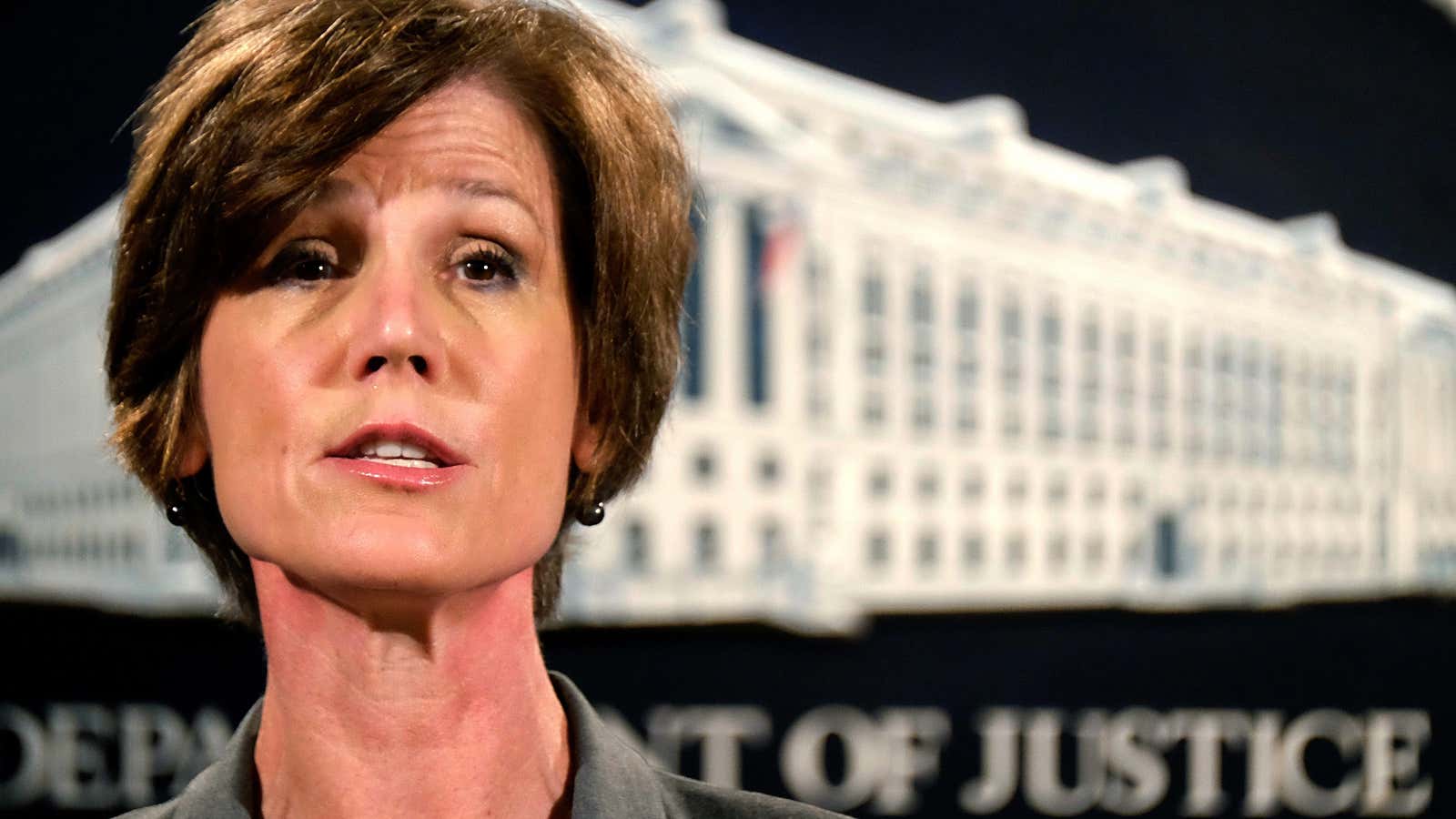Former acting US attorney general Sally Yates will be testifying today (May 8) at a Senate subcommittee hearing investigating Russia’s involvement in the 2016 US election. The Senate Judiciary Subcommittee on Crime and Terrorism hearing will be broadcast live here, and is scheduled to start at 2:30pm.
Yates’ appearance is highly anticipated by critics and supporters of president Donald Trump alike. (Yates was originally scheduled to appear publicly before the separate House intelligence committee in March, but that hearing was abruptly canceled by intelligence committee chairman David Nunes.) However, much of the information in her testimony is unlikely to result in a path to impeach Trump, as his fiercest critics hope, or to exonerate the administration, as his White House supporters would like.
For anyone who has been following the investigation closely in recent months, much of the information Yates is expected to provide may already have been released via anonymously sourced news reports. Today her testimony will become part of the official Congressional investigation, however.
Viewers can expect an on-the-record account of when the Trump White House was notified by the Department of Justice about the actions of former national security advisor general Michael Flynn, and specifically about his interactions with Russian and other foreign officials ahead of the presidential inauguration. There may also be more information about what was alarming to the Department of Justice about those interactions.
What exactly the White House knew about Flynn and his conversations with Russian ambassador to the US Sergey Kislyak in December remains a matter of much speculation. Crucially, what Yates says under oath may contradict some or several of the White House’s official statements regarding Flynn, who was fired after just 24 days on the job.
Here are the key White House claims that Yates may be able to provide new context for:
Jan. 15: Vice-president Mike Pence says in a televised interview with CBS that Flynn’s “several” calls with Russian ambassador Sergey Kislyak on Dec. 29, the day that president Obama announced new sanctions against Russia, were purely coincidental. When asked whether anyone from Trump’s campaign had ever been in touch with Russia, Pence says ”of course not,” adding “I think to suggest that is to give credence to some of these bizarre rumors that have swirled around the candidacy… What I can confirm having spoken to him about it is those conversations that happened to occur around the time that the United States took action to expel diplomats had nothing whatsoever to do with those sanctions.”
Jan. 26: Yates notifies the White House counsel that she has concerns about Flynn, according to later White House statements.
Jan. 30: The White House fires Yates for “refusing to enforce a legal order designed to protect the citizens of the United States,” after she says she is not convinced the so-called Muslim ban is “lawful.”
Feb. 13: The Washington Post reports that Yates told the White House in “late January” about concerns Flynn had mislead officials about his Russia conversations, and could be vulnerable to blackmail. Former national security director James Clapper (who also will testify today) shared those concerns, the report notes.
White House advisor Kellyanne Conway says in a televised interview Flynn “does enjoy the full confidence of the president.” Flynn offers his resignation in a letter, hours after saying he has the full “confidence” of the president in a public interview. “I inadvertently briefed the Vice President Elect and others with incomplete information regarding my phone calls with the Russian Ambassador,” he wrote.
Feb. 14: Press secretary Sean Spicer says in his daily briefing that Flynn was fired after several weeks of review. Spicer claims the president no longer trusted Flynn, but denies that Flynn had done anything illegal:
“Immediately after the Department of Justice notified the White House counsel of the situation, the White House counsel briefed the president and a small group of senior advisors,” Spicer notes. “When the president heard the information as presented by White House Counsel, he instinctively thought that general Flynn did not do anything wrong, and the White House counsel’s review corroborated that.” Specifically on Yates, Spicer says:
The acting attorney general informed the White House counsel that they wanted to give a “heads up” to us on some comments that may have seemed in conflict with what he had sent the vice president out in particular. The White House counsel informed the president immediately. The president asked him to conduct a review of whether there was a legal situation there. That was immediately determined that there wasn’t.
March 24: The White House warns Yates, through a lawyer, that her discussions with the White House counsel are likely “covered by the presidential communications privilege” adding “the president owns those privileges” and that she needs to get permission to testify.
March 28: Spicer says Yates is free to testify.
May 8: Ahead of Yates’s testimony, Trump tweets that Yates should be asked “if she knows how classified information got into the newspapers soon after she explained it to W.H. Council.” (Trump later sent out an updated tweet correcting the spelling of counsel, as in legal counsel.)
